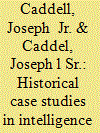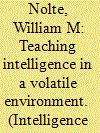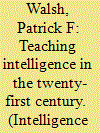|
|
|
Sort Order |
|
|
|
Items / Page
|
|
|
|
|
|
|
| Srl | Item |
| 1 |
ID:
155217


|
|
|
|
|
| Summary/Abstract |
This article discusses the use of experiential (or active) learning methods – specifically the use of simulations, exercises, and games – to enhance student learning in intelligence courses at universities to prepare students for careers in intelligence organizations. The article argues that most disciplines and academic fields employ laboratories, simulations, internships, and practical exercises when the learning objective is to develop the required skills to successfully practice a professional discipline. The use of active learning techniques challenges prospective intelligence professionals to learn by exercising previously learned concepts, frameworks, and tools in simulated ‘real world’ scenarios, leading them to gradually become more technically skillful and effective.
|
|
|
|
|
|
|
|
|
|
|
|
|
|
|
|
| 2 |
ID:
155211


|
|
|
|
|
| Summary/Abstract |
This paper identifies best practices for the selection and delivery of historical cases for use in intelligence studies education. These pedagogical imperatives (and avoidable pitfalls) apply to different levels of instruction and are relevant both for public and classified instruction. Drawing upon relevant social science scholarship on the use of historical case studies, the authors propose methods to select appropriate cases tailoured to achieve desired learning outcomes, to promote active learning and to avoid common problems such as hindsight bias, oversimplified single-narrative interpretations and prepackaged ‘lessons learned’ devoid of historical context.
|
|
|
|
|
|
|
|
|
|
|
|
|
|
|
|
| 3 |
ID:
155214


|
|
|
|
|
| Summary/Abstract |
Offered the chance to create an intelligence studies program from scratch at The Catholic University of America, this recently retired career CIA officer and historian decided on two fundamentals. First, an ideal intelligence program would take a ‘Goldilocks’ approach, neither relegating intelligence to the fringes (as academia has done in the past) nor elevating it to a degree program (as is the approach at dozens of US colleges and universities). Because US intelligence agencies prefer their candidates for employment to have substantive knowledge of global issues and language skills, a certificate or minor program in intelligence will educate students about intelligence without depriving them of the opportunity to major in a substantive field. Second, an ideal program will involve former professional intelligence officers to a high degree; too many academic programs in intelligence suffer from the metaphorical ‘Bulgaria problem’ in which alleged experts on Bulgaria don’t speak the language, have never been to Bulgaria, and don’t see their lack of experience on Bulgaria as a problem. Smaller programs, taught mostly by retired practitioners, are the ideal for intelligence studies.
|
|
|
|
|
|
|
|
|
|
|
|
|
|
|
|
| 4 |
ID:
155218


|
|
|
|
|
| Summary/Abstract |
This article is a summation of the emphases I place in my teaching about intelligence, both in academic settings and in courses presented to government and commercial clients. The main goal is to demystify and deromanticize intelligence, to present it as a normal function of government and one that has moral and ethical standards and can exist compatibly within a democratic government. The article also discusses suggested course readings, some successful term paper topics and the concept of graduate intelligence courses as a type of professional training. The article also notes some themes emphasized in courses on training new analysts in their required skill sets.
|
|
|
|
|
|
|
|
|
|
|
|
|
|
|
|
| 5 |
ID:
155219


|
|
|
|
|
| Summary/Abstract |
The article discusses the development of intelligence studies in recent decades, reflected in many of the characteristics of other disciplines, among them venues for unclassified literature on intelligence, participation in academic conferences, and the significant growth of degree- or certificate-based graduate or undergraduate programs. The article goes on to discuss the need to ensure that the teaching of intelligence reflects changes in the two fundamental environments in which intelligence must operate, that is, an operational environment no longer marked by the predominance of a closed state peer adversary, and an information and information technology environment reflecting the dramatic changes that have taken place – and continue to take place – in that latter environment. Teaching intelligence in these complex and fluid environments will require a careful balance between addressing intelligence structures, processes, and methods that characterized 20th century intelligence with at least the likelihood that many of those fundamentals will require replacement or significant redefinition to meet twenty-first century needs. In these circumstances, teaching intelligence must mean preparing students to operate within – if not to create – an intelligence of the future.
|
|
|
|
|
|
|
|
|
|
|
|
|
|
|
|
| 6 |
ID:
155220


|
|
|
|
|
| Summary/Abstract |
Since 9/11, the ‘Five Eyes’ countries have seen a dramatic rise in intelligence training and education courses across the national security and law enforcement contexts. However, there remains little publicly available empirical evidence to demonstrate specifically where improvements have been made to workplace practices and processes as a result of this investment. This article, argues that the education sector in the intelligence discipline lacks an evaluation research agenda, for validating the workplace effectiveness of training and education programs. Further, a first step in understanding whether curriculum are ‘fit for purpose’ may be articulating some underlying common normative principles for evaluating programs in any intelligence context.
|
|
|
|
|
|
|
|
|
|
|
|
|
|
|
|
| 7 |
ID:
155216


|
|
|
|
|
| Summary/Abstract |
This essay begins with a look at several ingredients – such as subject mastery and careful course planning – that, combined, can lead to effective teaching. It then turns to some classroom activities that have proven to catch the attention of students and help them to learn about the intricacies of national security intelligence. These activities include the preparation of congressional briefing books related to mock hearings on intelligence programs; ‘murder boards’ that sharpen the critiquing skills of students, as well as their ability to speak more forcefully and convincingly; and the use of dramatic scenarios to spark classroom discussions about ethical challenges faced by intelligence agencies.
|
|
|
|
|
|
|
|
|
|
|
|
|
|
|
|
| 8 |
ID:
155215


|
|
|
|
|
| Summary/Abstract |
The ‘problem’ of designing a professional intelligence education conforming to nationally accredited standards for higher education is resolved by the Norwegian Defence Intelligence School’s accredited programme offered to professional intelligence officers from the broader Norwegian intelligence community. The programme provides an opportunity to develop academic knowledge of intelligence without interrupting career progression, and serves as a forum for developing a shared sense of community within Norway’s security and intelligence bureaucracy. Focusing on four core ‘academic’ intelligence modules, this paper introduces the origins of the school and the rationale for the programme, presents and discusses the subject matter taught throughout the programme and concludes with reflections of the realization of the initial vision.
|
|
|
|
|
|
|
|
|
|
|
|
|
|
|
|
| 9 |
ID:
155212


|
|
|
|
|
| Summary/Abstract |
This article examines the Brunel Iraq HUMINT Matrix exercise. The purpose of this approach to intelligence pedagogy is to get participants to think through and work out analytic methods, issues, and potential solutions from first principles and for themselves. Our strategy is to try and fuse training and education learning outcomes, so that students emerge with a technical competence in analytic methods, underpinned by a deeper understanding of the foundations and internal logic shaping those methods. The Iraq Matrix exercise seeks to unpack and examine the nuts and bolts of source evaluation, and to test alternative hypotheses with particular attention to the relationship between the quality of various sources and, the weight of judgements they can or cannot sustain. The ultimate goal is to encourage what is currently fashionably referred to as ‘reflexive practice’, whereby the practitioner reflects critically and self-critically upon how their task works and how they do it, then uses those insights to improve their workplace performance. But not all of our teaching is directed towards practitioners. For those whose aims are scholarly and academic, the aim is to give observers a more visceral understanding of the challenges of the intelligence task they intended to study. Here the intended reflexive practice goal is to encourage an empathy with the workaday challenges facing those in the business of intelligence analysis, and to discourage the observer’s temptation to make facile and simplistic judgements about processes or events.
|
|
|
|
|
|
|
|
|
|
|
|
|
|
|
|
| 10 |
ID:
155213


|
|
|
|
|
| Summary/Abstract |
This article uses our experience of teaching a postgraduate course in Intelligence Studies as a basis for discussion of core issues relating to contemporary intelligence education. After situating our understanding of Intelligence Studies in the context of wider debates about its nature and purpose, the article goes on to discuss key questions of how, who, and what we teach when we teach ‘intelligence’. It discusses the pedagogical benefits of a Distance Learning approach to teaching intelligence. It presents a picture of variegated demand arising from a dynamic and expanding professional sector and the continued appeal of studying the subject to non-professionals. It concludes that in providing ‘education’ rather than ‘training’ and taking a constructivist approach to learning as a shared journey, the ‘Leicester Approach’ can both improve the practice of intelligence and widen participation in key debates about intelligence.
|
|
|
|
|
|
|
|
|
|
|
|
|
|
|
|
| 11 |
ID:
155210


|
|
|
|
|
| Summary/Abstract |
This article notes that it was a student who suggested to me that I teach a course on intelligence. After some thought, I acted on his idea. Selecting books for the course was a significant task. One ‘lesson learned’ in doing so was that, while some books on intelligence can be great reading for those already knowledgeable on the basics, they can be too sophisticated for undergraduates who (like most Americans) are ignorant about U.S. intelligence agencies and their place in the larger government. Other books have been nearly perfect for such students. Since Villanova University is a few hours from Washington, D.C., students have rarely encountered anyone who actually works in intelligence. Therefore, bringing alumni of our school who do just that work back to campus helps the course seem less ‘ivory tower’ to students. As I am a historian, as much as a political scientist, I find that certain documents I have found in archives can be fascinating reading for students in the course.
|
|
|
|
|
|
|
|
|
|
|
|
|
|
|
|
|
|
|
|
|